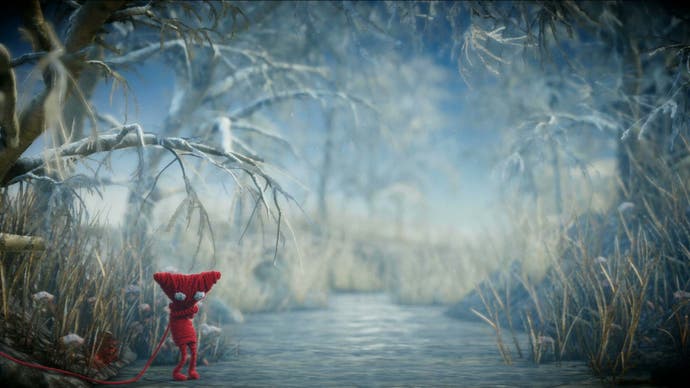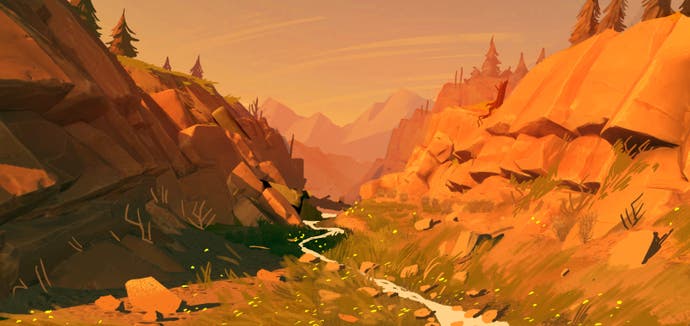In Play: Games' relationship with nature is weird
Escaping to - or from - the great outdoors in Firewatch, Unravel and Dying Light.
In Play is a column taking a weekly sideways look at new game releases. It's a bit like our old series Game of the Week, if you remember that.
This week, scientists used lasers and mirrors to measure a distortion in spacetime to an accuracy of one thousandth of an atom's nucleus, a phenomenon which lasted 20 milliseconds. From this, they deduced that somewhere across the universe, a very long time ago, two black holes had collided, and in so doing they proved Einstein's theory of gravitational waves. Let me just restate that: they measured a fluctuation in spacetime, an actual ripple in the not-so-constant constants of spatial and temporal relationships that we humans use to navigate the concept of our own existence. This is the level our species has attained in our technological observation of the natural world.
And yet, when we use the technology and art of video games to observe the natural world - well, we get all weird about it.

Video games are pretty great at observing themselves. It's a naturally solipsistic medium. Take this week's Project X Zone 2 on 3DS (review coming soon), which collects characters from Bandai Namco, Sega, Capcom and Nintendo games and combines them in a game which is itself a hybrid of role-playing and strategy. A satisfying mash-up for gamers, but a completely unintelligible frame of reference for anyone else.
Or we have Assassin's Creed Chronicles: Russia, which Johnny and Tom played earlier this week. This side-scrolling spin-off has one foot in the real world - specifically, the Bolshevik revolution of the early 20th century - but it still mainly exists in the context of the games which sired it, which themselves exist within the giant postmodern air quotes of their framing device: a future in which people play game-like simulations of their ancestors' history. Assassin's Creed: Black Flag even satirised the culture of the studio where it was made. How very meta - but in video games, meta is the new normal.
When it comes to recreating or simulating the world we know, video games excel at many aspects of it, but it is odd that they seldom do it with a straight face. There's usually an element of fantasy, or there are weird concessions to the weird logic of video games. That doesn't change when games seek to escape the angular confines of an urban environment and - as three of this week's releases do - head for the great outdoors.
Take Unravel. EA's twee faux-indie platformer is more than a bit confused about nature. The idea of a little yarn doll coming to life and exploring familiar environments, enlarged to intimidating scale, is enchanting enough on its own, with its built-in poignant echoes of the wonder and fear of childhood. But this was not enough for developer Coldwood Interactive, which has added additional layers of metaphorical meaning about the limits of love and about caring for the environment, and has got itself in a contradictory muddle in the process.

"Unravel is firmly on the side of Mother Nature as a story - there's a chapter set in a toxic waste site which accompanies some preaching about the evils of profit motives - but as lovable as he is, Mother Nature really has it in for Yarny," wrote Edwin in our Unravel review, noting how hostile the game's animal life is. Because even video games about the restorative power of love and the beauty of the natural world need lethal hazards, and they will take them where they can get them. Also: this is a platformer, and it was established long ago in the language of platformers that cute little creatures were the enemy, and there is nothing we can do about that now, is there? Video game semantics, built around struggle and conflict and on some pretty surreal, not to say completely potty, classic texts, can make elegant metaphor a bit of a struggle for the medium. Unravel's obsequious tone doesn't help it. As Edwin wrote, "the tone is somewhat cloying and affected, for all the beauty of individual assets and effects. This is one of those games that wears its heart on its sleeve like an expensive, shiny bauble, to be waved under the player's nose at every opportunity."
Also heading for the hills this week is Dying Light: The Following, the expansion to Techland's scrappy open-world zombie survival game, which takes it from parkour in city streets to a countryside drive. Environment was one of the strengths of last year's original: "There's always been lots to love even in the game's boxy, foggily-drawn cityscapes - a rare exoticism (the Middle East as civic environment, rather than warzone, is a collective blind spot) offset wonderfully by the lingering, soured notes of a John Carpenteresque soundtrack," Nathan noted in our review. But out in the open, the game loses focus and just goes for arms-race escalation: more, bigger, tougher zombies and a car to mow them down in. It's still prone to "masochistic fun-gating", and still fun in spite of that. But why is it so often that, when a game puts you in a larger space than you were in before, it immediately shrinks it - by letting you cross it faster and by filling it with bigger things? Why is genuine bigness - awe-inspiring, fear-inducing bigness - so hard for games to do?

This is one of the things that makes this week's standout release, Firewatch, refreshing. Of course, one of its chief selling points is its rendition of the great Wyoming wilderness, by artists Olly Moss and Jane Ng, in the creamy, stylised tones of a 1930s travel ad. It's gorgeous and evocative in a way photorealistic graphics struggle to attain: a good start. But what's really striking about Firewatch is how it evokes the sheer isolation of the location by making you feel trapped there. Most developers would get caught up in offering the fantasy of freedom, of escape, but Campo Santo has other ideas. Sometimes escape leads you straight into captivity, and so it is for Firewatch's protagonist Henry. Firewatch does what few games would dare: gives you a gorgeous playpen, and then deliberately and carefully restricts you in it. You can't reach that mountain on the horizon, and that makes it seem so very far away.
"Firewatch sells itself as a mystery, but over time I came to think that it's not a narrative game so much as it's a character piece. Its Wyoming map presents a geographical prison, and it serves to remind you that Henry is a prison too. He's there to trap you," wrote Christian in our review. "Firewatch is very good at this: the geometry of paranoia." Once again, the concept is counter-intuitive: the great outdoors as a theatre for something dark, internal, psychological. But this time, I think it's on the money. Nature isn't a metaphor and it isn't a playground. It isn't a pretty picture and it isn't an implacable enemy. It's bigger than you can imagine, and it doesn't care about you at all. How does that make you feel?

